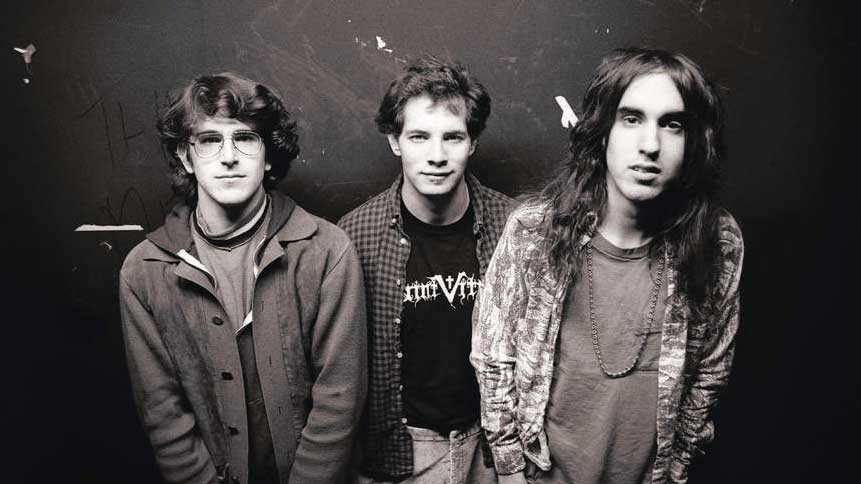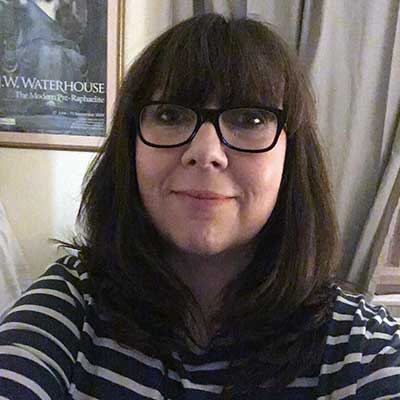J Mascis is known chiefly for his long career – four decades – as a founder member, guitarist and vocalist with pre-eminent psychedelic Americana punk group Dinosaur Jr. He was born in Amherst, Massachusetts, started the band in Amherst and still lives in Amherst, in a colourful, creatively decorated home that once belonged to Buddhist author and academic Robert Thurman (father of actor Uma).
Growing up in this culturally bustling New England college town surrounded by farmland, forest and hiking trails, Mascis’s initial musical nourishment was classic 60s and 70s rock. Listening to it built an appetite in him to play music. He “borrowed” his elder brother’s Aerosmith and Deep Purple records, and the first album he purchased was Layla by Derek And The Dominos.
In the mid-70s, aged 11, he played timpani in the school orchestra and took drum tuition, with Deep Purple drummer Ian Paice one of his many inspirations. Later, the dynamite pairing of Ian Hunter and Mick Ronson, supporting the J Geils Band, was the first live show Mascis attended, at Springfield Civic Centre in 1979.

With the arrival ofthe 80s, everything began to change, leaving Mascis at odds with much of what was happening musically elsewhere in the country; a punkoid, genre-resistant square peg in a round-hole world of drugged up hippies, polished synths and big hair.
Close to home, the popular preference was for the former. As the doors to 1980 flung open, owner about punk music and ask for records he’d read about.
“Before MTV, and with no internet, you had to be a detective,” Mascis says. “Fanzines were the main thing, and the store kept Sounds, who’d made this glossy mag called Punk’s Not Dead with Wattie [from The Exploited] on the cover. It featured the all-time 100 punk songs, so I tried to collect each one.”
Closely allied to punk, thrash metal was also on Mascis’s radar. “Since I was a kid, any band that had Motörhead as their main influence, I would probably like them. Like Metallica. Isaw them early on, with Cliff Burton, and they were awesome. He was the main thing that you’d watch, the focal point.”
As four angry (but slightly nerdy) young men against the world (well, Massachusetts) Deep Wound’s 1983 demo was a “definitely a rebellion against drugs and hippies, the acid casualties that I wanted to be free of”, Mascis says. “I thought: ‘This is not where I want to be. Where are my people that I can relate to?’ As soon as I got the first] Minor Threat record I was like: ‘This is exactly where I’m at.’ Our interests were more like straight-edge.”
Deep Wound’s dissatisfaction and alienation was pretty clear just from their song titles: Video Prick, In My Room, You’re False, Lou’s Anxiety Song. After they’d played support shows around Boston, another friend, Gerald Cosloy, funded a seven-inch on his own label, Radiobeat. Nevertheless, the group broke up.
Barlow, Mascis and Nakajima formed Mogo with Emmett Patrick Murphy (aka Murph) on drums, Barlow moving over to bass, and Mascis displaying a natural flair for guitar, and a single-mindedness that would ruffle feathers later.
“I started playing guitar because I didn’t like guitarists around here,” he says. “It was a limited pool, and I thought hardcore was over. Minor Threat became Fugazi, Negative Approach became The Laughing Hyenas, and The Laughing Hyenas were definitely influenced by The Birthday Party. So The Birthday Party was a big band for us too, and in order to get out of hardcore we’d move into something else.”
That “something else” would be the band Dinosaur. Nakajima was relieved of his duties after an outburst on stage, leaving a trio of Barlow, Mascis and Murph to evolve into a new formation of noisy punk expression, shot through with “ear-bleeding country music”.
Another influence was Arizonan hardcore punk band-turned-alt.country act Meat Puppets. “We loved them from the beginning, they were the craziest hardcore and really amazing,” says Mascis. “Then they went country. We followed in their footsteps because I liked where they were going… However, people did think we were Meat Puppets rip-offs. They also said that I sang like Neil Young. But that wasn’t intentional, that’s just what comes out.”
Now it was 1984, surely the world – or at least Amherst – was ready for Dinosaur? “We tried to get gigs but we were banned from pretty much every club locally, as we were very loud and uncompromising.” Mascis recalls, smiling. “It’s a bad combination to be really loud and have no fans if you’re playing at a bar, because they don’t like you anyway, and they can’t hear drink orders.
“We had to venture further out,” he continues. “Boston was two hours away, but they still didn’t like us, they were hardcore-entrenched. They’d be like: ‘I hate this country bullshit. What are you guys doing?’ But we kind of found our people in New York.”
A record deal from Cosloy’s new place of work, Long Island independent rock label Homestead, plus Dinosaur’s friendship with and support from NYC-based labelmates Sonic Youth gave the group some anchorage. But by 1985, and with their first, self-titled album emerging, Mascis still didn’t feel included in a bigger picture yet. The Billboard 100 charts were filled with shiny mainstream pop, and soul. Alternative music was rumbling underground, on cable TV and on college radio stations.
“I was always a lone wolf,” Mascis says. “In New York I felt a little like part of something, but I remember hearing people talking about ‘The Western Mass hardcore scene’ and saying: ‘I’m going to a scene meeting.’ I was like: ‘For me, that is not going to happen’.”
After some positive reviews for their debut release, and now renamed Dinosaur Jr. (they were warned off their original name by the band Dinosaurs, comprised of vets from Jefferson Airplane, Quicksilver Messenger Service and the Grateful Dead, among others), their second album, You’re Living All Over Me, was released in 1987. They had a new deal with Black Flag’s highly regarded punk label SST, a long sought-after prize. Mascis views the period as a pivotal one.
“I felt like we had found our sound,” he says. “We were aiming for Jesus And Mary Chain – noisy but poppy underneath, and more Sabbath than Beach Boys. With the first album we were fishing around and hadn’t played together much. With You’re Living All Over Me we had our sound, we got on SST and everything kind of came together.”
Dinosaur Jr.’s sound, and this record – overdriven, melodic, with feral soloing from Mascis – would become massively influential, with developing indie acts such as My Bloody Valentine quoting its sonic chaos. Sonic chaos was reigning in LA too, amid the hairspray and make-up of the glam-metal scene. Was this something that Mascis could relate to?
“It depended on the band and the song,” he says. “Cinderella I liked because they sounded kind of Stones-y and had cool gear, nodding to the past. A turn-off would be if they had weird pink guitars…”
When scruffy tearaways Guns N’Roses, with their Fenders and Les Pauls, roared out of the Strip, Mascis was impressed. “I think everybody liked them,” he says. “And they tapped into punk rock. Some of their early recorded live stuff was at the Ritz, a [New York] club that we played, and they showed that on MTV, which was pretty cool.”
Mascis’s lone-wolf sentiment from earlier comes across strongly in Freakscene, the 2021 documentary that details the tensions and horn locking that occurred in Dinosaur Jr.. This occurs particularly between Mascis and Barlow, reacting to Mascis’s dominance in certain aspects of the band, such as songwriting.
“It’s young people growing up, I guess,” Mascis says. “When I first met Lou he didn’t talk. So we got along well, musically. But then he got a girlfriend. That pumped up his ego and he started talking all the time. I realised: ‘Maybe I don’t like this guy, now that I hear him talking.’”
Tempers flared while making their third album, Bug. Although a success for the group in commercial terms – creating their defining ebullient slacker anthem, Freak Scene – the band were falling to bits.
“We barely had enough songs for Bug,” Mascis says. “I just kept going [with writing] so we could make an album. Don’t was written to fill up time, and it was a really weird experience, because I handed Lou the lyrics for him to sing: ‘Why don’t you like me?’. He went absolutely crazy in the studio, screaming the words, and was coughing up blood by the end of the tape.”
Inevitably, Barlow soon left, and set up his fêted indie group Sebadoh. Mascis smiles as he recalls using The Screaming Trees as a bassist-recruitment agency, following Donna Dresch’s cover period in the role for live work, as he and Murph continued DinosaurJr., signing to a major label for 1991’s Green Mind.
Many years down the road, in 2005, Barlow, Mascis and Murph happily reunited. Mascis would go on to play with stoner metallers Witch, his post-Dinosaur Jr. band from 2000 J Mascis + The Fog, 70s-influenced rockers Sweet Apple, and Heavy Blanket, an enigmatic psychedelic instrumental group that features Mascis’s “old school friends” Johnny Pancake and Pete Cougar.
Looking back on his 80s – a decade in which Mascis and his community’s DIY creative expression, freedom and ideology ran determinedly in parallel to the flashier, bigger business option – what was he hoping for in the future?
“To make enough money from touring to not get a job!” he says. “I was still in college, so I wanted to quit that, and I pretty much did after Bug came out. I didn’t want to ask for too much, but what happened… Well, it was all alright."
Heavy Blanket’s new record Moon Is is out now via Outer Battery Records. Dinosaur Jr. play The Garage, London, November 12-15 as part of an international tour celebrating 30 years of fifth album Where You Been. Full dates and ticket details.

